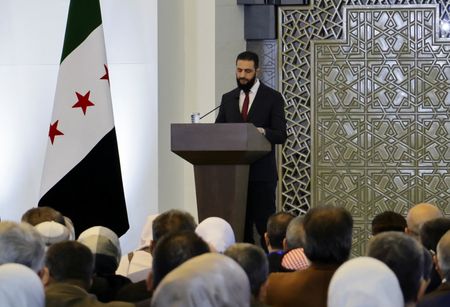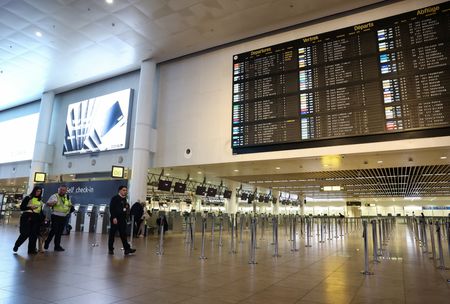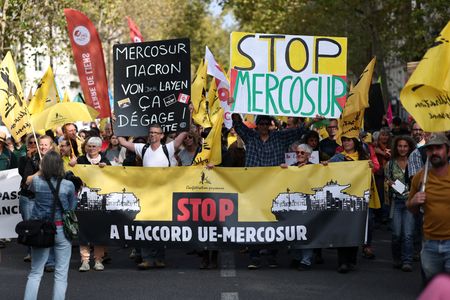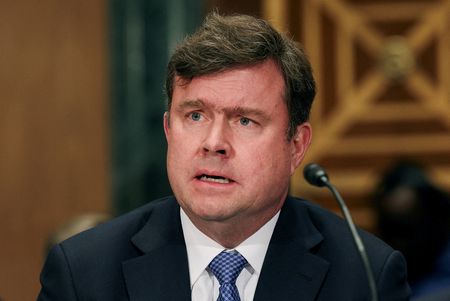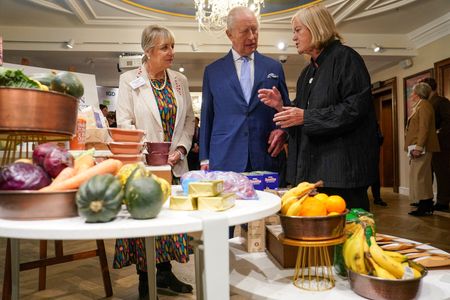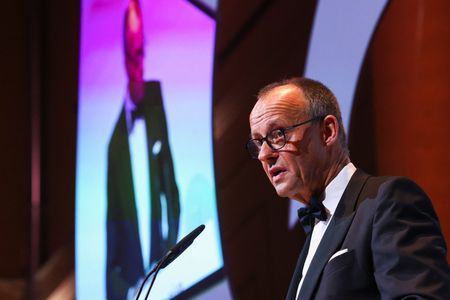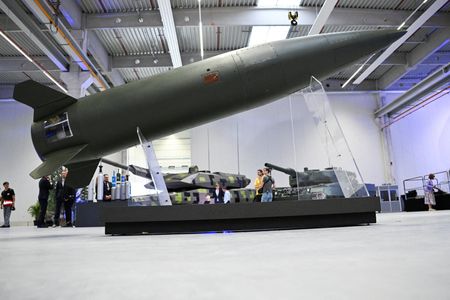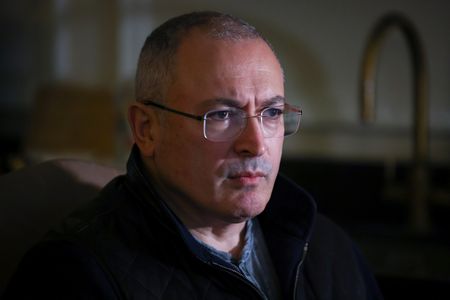By Timour Azhari
DAMASCUS (Reuters) – Syrians agreed on Tuesday to form a committee to draft a constitution that enshrines justice, freedom and equality for all, according to the closing statement of a landmark national dialogue conference held at the presidential palace in Damascus.
Billed by Syria’s Islamist rulers as a key milestone following the end of decades of Assad family rule, the conference was attended by hundreds of Syrians who met at the so-called People’s Palace in the hills above the capital.
The closing statement, read out after a day of workshops, called for upholding freedom of expression as a value Syrians have “paid for with their blood” and preserving “peaceful coexistence between all components of Syrian society”.
The statement made no mention of a role for religion in the state, other than saying public positions should not be influenced by sectarian or ethnic quotas.
The participating parties called for Syria’s territorial integrity to be upheld, they condemned an Israeli incursion, and said Western sanctions imposed on the country should be lifted.
Proponents hailed the one-day event as an unprecedented forum for free expression at the former centre of ousted President Bashar al-Assad’s power, though critics fear it may be window dressing for a transition process steered heavily by Syria’s new leaders.
Syria’s political roadmap remains broadly undefined, save for a new transitional government set to take power on March 1. Its members have yet to be announced.
The summit was closely watched by Arab and Western capitals alike, which have conditioned full ties with Syria’s new leaders – including the possible lifting of sanctions – on whether the political process is inclusive of Syria’s ethnically and religiously diverse population, three diplomats said.
CONCERNS
Participants said the discussions were well-organised – but they still had concerns over how much their input would count in a political process heavily controlled thus far by Hayat Tahrir al-Sham (HTS), the Islamist group that toppled Assad.
“Our eyes remain on two things: that this discussion needs to be an ongoing process, and that we need to know how these discussions will be used,” Hanin Ahmad, an activist from the central province of Homs, told Reuters.
Ahmad participated in the session on personal freedoms, where she said there was broad consensus on protecting the civic, political and individual liberties of Syrians.
“We feel we’re trying to rebuild Syria from scratch,” said Adnan Tarabishy, a Syrian businessman who took part in the economy session.
Syrian President Ahmed Sharaa, appointed to the post last month by the armed factions he leads, made opening remarks and received handshakes from hundreds of attendees at the end of the conference.
“What we are living today is an exceptional, historic and rare opportunity. We must take advantage of every moment of it to serve the interests of our people and our country,” he said.
Participants divided into six working groups to discuss a transitional justice system; the constitution; building state institutions; personal freedoms; Syria’s future economic model and the role civil society would have in the country.
The discussions were confidential, with a moderator allocating two minutes to participants to speak and restrictions on removing any documents from the summit hall.
Organisers say the final declaration will help shape a constitutional process intended to lay out the basic principles for Syria’s new governing order and will be considered by the new transitional government.
Saudi Arabia’s foreign ministry welcomed the conference and said it hoped the event would bolster Syrian national unity.
Syria-based diplomats were not invited to the conference, three foreign envoys in the country said. Its organisers did not take up offers by the United Nations to help with the summit.
SANCTIONS
The U.N., the United States and other countries have imposed sanctions on HTS as a group. The U.S. and the European Union also have widespread sanctions in place on Syria, but have issued temporary lifts on some sectors in recent weeks.
Speaking after Sharaa, Syria’s Foreign Minister Asaad al-Shibani criticised the sanctions, saying they were being used “as a means of pressure” on the Syrian people.
Following his comments, a woman in attendance stood up and shouted, “Thank God, the People’s Palace has returned to the people!”
Five members of the seven-strong preparatory committee are either in HTS or close to the group, and there are no Druze or Alawite members, both of which are significant minorities in Syria.
No members of the Kurdish-led autonomous administration in northeast Syria or the U.S.-backed Syrian Democratic Forces were invited, officials from both groups told Reuters.
(Reporting by Timour Azhari; Writing by Maya Gebeily; Editing by Sharon Singleton, William Maclean and Gareth Jones)

